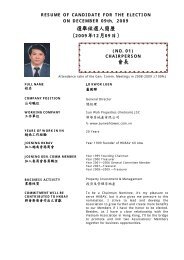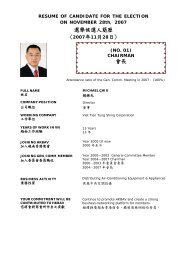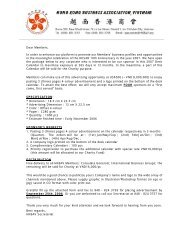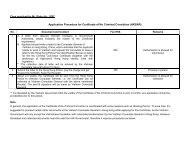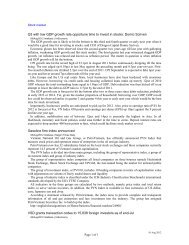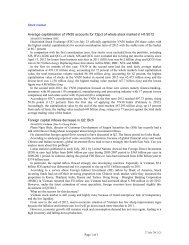31 Aug 2012 Intellasia Finance Vietnam - Hong Kong Business ...
31 Aug 2012 Intellasia Finance Vietnam - Hong Kong Business ...
31 Aug 2012 Intellasia Finance Vietnam - Hong Kong Business ...
Create successful ePaper yourself
Turn your PDF publications into a flip-book with our unique Google optimized e-Paper software.
BUSINESS<br />
<strong>Vietnam</strong> finance & business <strong>31</strong> <strong>Aug</strong>ust <strong>2012</strong><br />
Cashew paradox:<br />
farmers cut trees,<br />
firms increase imports<br />
Third, in case the plant was transferred to SCIC, industry experts assumed the plant's<br />
performance could hardly be noticeably improved since SCIC did not have much experience<br />
in governing and managing cement business and construction industry.<br />
Besides, it takes time for the MoF and SCIC to mull the plant reshuffle plan.<br />
According to Vinaincon's chief accountant Hoang The Hien, Vinaincon is still waiting<br />
the government's instruction about how to deal with Thai Nguyen cement debts. The<br />
plant now runs at 50-60 per cent capacity which fails to cover high borrowing cost and<br />
machinery amortisation fees.<br />
To get additional income sources for paying debts, the plant must reach at least 80 per<br />
cent capacity, a target now out of reach in the face of low cement market consumption.<br />
Thai Nguyen cement's total designed capacity is 1.51 million tonnes per year. Its official<br />
cement brand is Quang Son.<br />
http://www.vir.com.vn/news/business/cement-plants-feet-caught-in-stone.html<br />
<strong>31</strong>/AUG/<strong>2012</strong> INTELLASIA | TUOI TRE<br />
While local farmers have been jostling to chop down their cashew trees due to dirt<br />
cheap prices, cashew manufacturers have had to import half of the raw materials needed<br />
for production.<br />
The import rate is expected to rise further in the future, as the local areas for cashew<br />
plantations have increasingly decreased, despite the fact that <strong>Vietnam</strong> is the world's<br />
top cashew nut exporter.<br />
In the southern province of Binh Phuoc, farmers are still busy emptying their cashew<br />
plantations, as prices have nearly halved compared with the same period last year.<br />
"Prices have fallen from VND30,000 a kilogram last year to only VND17,000 a kilogram<br />
now," said Bui Minh Tien, from Loc Ninh District.<br />
Tien said he is switching to growing pepper, which will yield bigger profits, as he is<br />
no longer able to make ends meet with the VND45 million (US$21,500) annual income<br />
from the 3.5-hectare cashew plantation.<br />
Following the trend, other farmers in neighbouring localities have also replaced their<br />
cashew gardens with pepper or rubber crops.<br />
And this tree cutting wave is out of authorities' control, Nguyen Van Toi, director of<br />
the province's Department of Agriculture and Rural Development, admitted.<br />
"Cashew manufacturers do not buy the products directly from farmers, but via a multilayer<br />
chain of traders and small plants, and farmers are thus forced to sell at low prices,"<br />
he explained. "So there is no surprise when farmers rush to empty their<br />
plantations."<br />
Increased imports<br />
In an opposite race from the farmers, manufacturers have had to increase imports of<br />
raw cashew for their production.<br />
Local manufacturers are expected to import an additional 400,000 tonnes of cashew<br />
this year, according to its governing body, the <strong>Vietnam</strong> Cashew Association (Vinacas).<br />
In the year to mid-<strong>Aug</strong>ust, some 215,000 tonnes of cashew have been shipped to the<br />
country, according to figures from the general Customs Department.<br />
However, the director of a cashew manufacturer in Dong Nai said the number is much<br />
bigger, as some companies are using a large amount of raw material imported in late<br />
2011.<br />
"Some major businesses have been exporting products made merely from imported<br />
materials this year," an industry expert, who wished not to be named, said.<br />
"Manufacturers prefer importing than buying from local farmers because imported<br />
prices from Cambodia and African countries are far lower than domestic rates," explained<br />
another company director, who also wished to remain anonymous.<br />
http://tuoitrenews.vn/cmlink/tuoitrenews/business/cashew-paradox-farmers-cuttrees-firms-increase-imports-1.84755<br />
<strong>Intellasia</strong> <strong>31</strong> <strong>Aug</strong>ust <strong>2012</strong> 39 / 46



